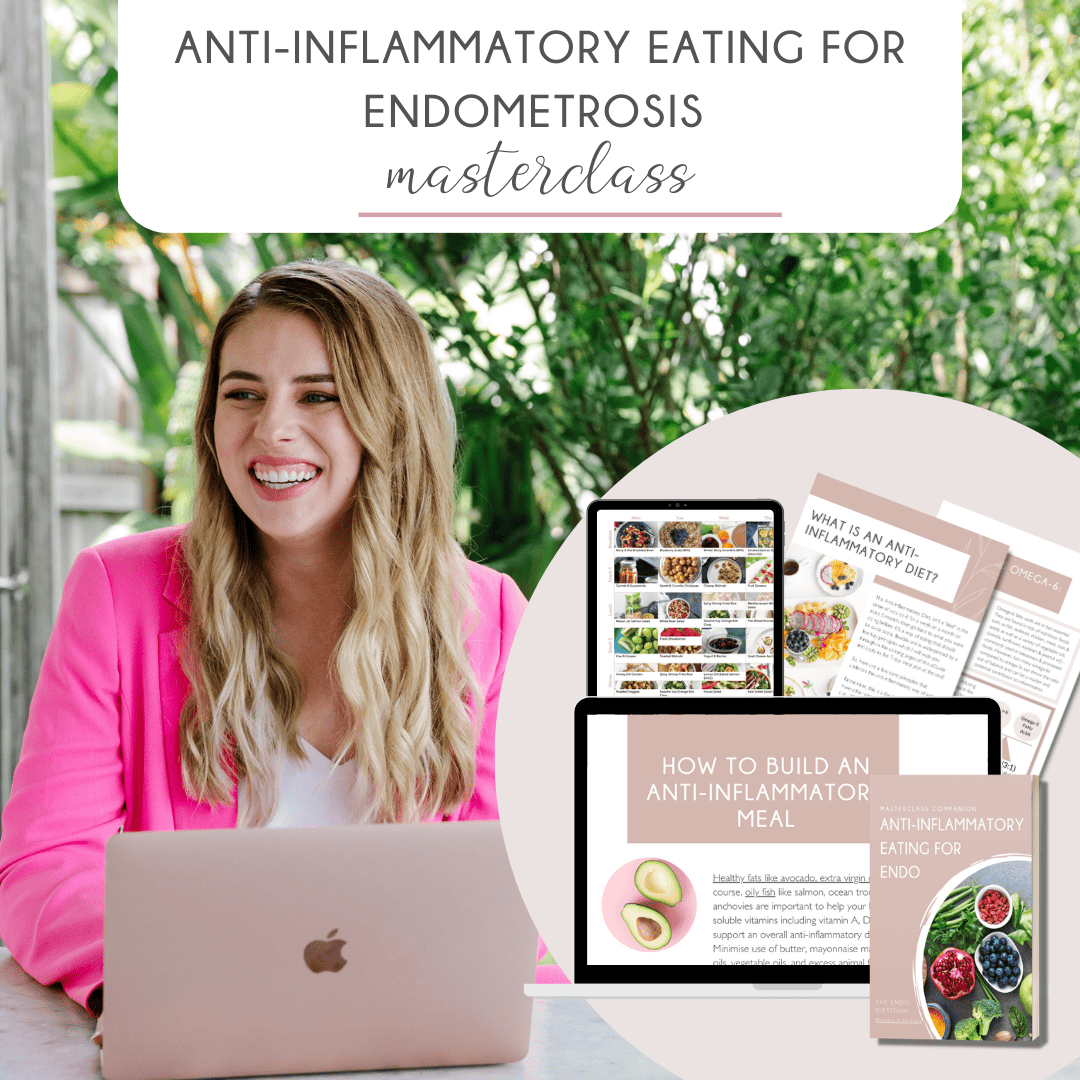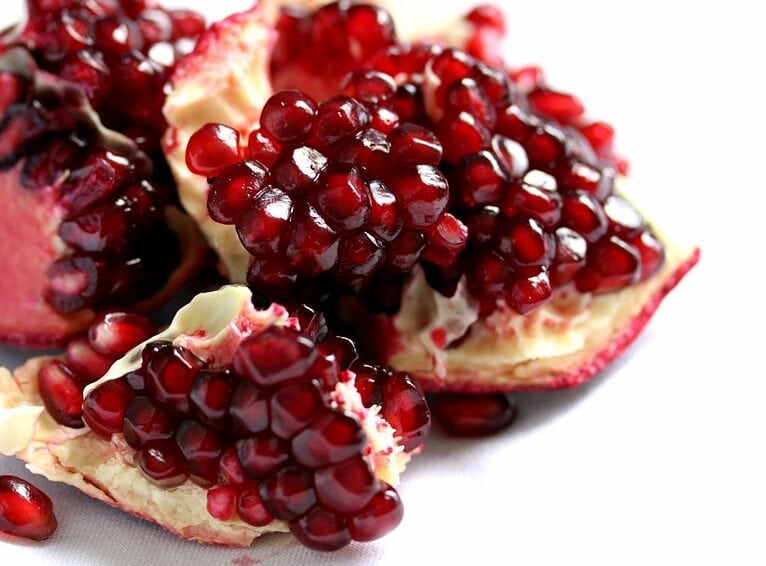Diet and nutrition are critical in managing endometriosis and improving overall well-being. Sadly, the role of nutrition and dietitians in the endometriosis space is often called into question, despite mounting science of its beneficial role in managing inflammation, reducing gut symptoms and improving energy levels in those with endometriosis.
As an endometriosis dietitian, I am passionate about highlighting the transformative power of diet in supporting individuals living with this condition.
By implementing personalised dietary strategies, those with endometriosis can experience remarkable improvements in symptoms and quality of life, and yes, sometimes those improvements even surprise me!
Let’s explore key areas where diet and the expertise of dietitians can make a substantial difference in your endometriosis care.
Anti-inflammatory Eating Strategies for Pain
Incorporating anti-inflammatory foods into your diet can alleviate the pain associated with endometriosis.
By reducing inflammation-promoting foods and increasing the consumption of nutrient-dense options like colourful and antioxidant-rich fruits, vegetables, whole grains, and healthy fats, individuals may experience reduced pain and inflammation.

Discover More about Endometriosis and Nutrition with our 60-minute Masterclass!
Want Scientifically Proven Nutrition and Lifestyle Strategies to Combat Endo Pain and Symptoms…
Regain Control of Your Life and Flourish Again with our 1-hour Masterclass! ONLY $75AUD !
Includes eGuide and 7-day meal plan!

Rectifying Vitamin & Mineral Deficiencies
Endometriosis can lead to deficiencies in essential vitamins & mineraels such as iron, vitamin B12, vitamin D, and calcium, which are surprisingly common.
A dietitian can help you to identify and address these deficiencies through dietary modifications and recommend appropriate supplementation when necessary.

Energy Support for Fatigue
Fatigue is a common symptom experienced for individuals with endometriosis, and it often goes beyond just feeling a little sleepy in the afternoon! It is common for it to impact your daily functioning.

An endometriosis dietitian can design an energy-supportive diet that provides adequate macronutrients and includes foods rich in complex carbohydrates, lean proteins, iron, and B vitamins to boost energy levels.
We can also help advocate for you to get further testing with your medical team to exclude other contributors to your fatigue so you can get back to living your life, with some more energy and vitality!
Navigating Appetite Changes and Pain
Pain and dysmenorrhea can significantly affect both appetite and food intake. Because chopping vegetables and sauteeing over a stovetop when you’re in agony just ain’t happening!

An endometriosis dietitian can help individuals develop strategies to manage appetite changes and provide nutritional guidance during times of pain flare-ups, ensuring that nutritional needs are met in a practical way despite the challenge of navigating endometriosis pain.
Weight Management Support
Weight fluctuations are not uncommon among individuals with endometriosis. And for some, this can be quite distressing and impact body image, and for others, the pain, treatments and fear of trigger foods can cause significant weight loss.
A compassionate endometriosis dietitian can offer personalised guidance, supporting weight loss or weight gain goals, while ensuring optimal nutrition and overall well-being, without the over-restrictive dietary patterns (I am looking at you, everything “free” diets!)
Gut Symptoms and Irritable Bowel Syndrome (IBS) Management
Endometriosis often co-exists with gastrointestinal symptoms and irritable bowel syndrome (IBS). Some studies saying as high as 50% of those with IBS also have endometriosis.
An endometriosis dietitian can help identify trigger foods, optimise gut health and the gut microbiome which is being studied as a new frontier of endometriosis diagnosis & management, and manage symptoms like bloating, gas, abdominal cramping, constipation & diarrhoea.
Optimising Gut Microbiome Function
The gut microbiome plays a vital role in estrogen metabolism, which can impact hormonal balance in endometriosis.

By recommending dietary interventions such as increased fibre intake,incorporating prebiotic fibre and probiotic-rich foods, an endometriosis dietitian can support a healthy and diverse gut microbiome.
Reducing Exposure to Endocrine Disrupting Chemicals (EDCs)
Certain environmental chemicals can disrupt hormonal balance, particularly estrogen, and may worsen endometriosis symptoms. Turns out one of the biggest exposures we have to EDCs is through our diet from food packaging, food storage containers, drinking bottles and more!
An endometriosis dietitian can guide individuals in selecting foods that minimise exposure to endocrine-disrupting chemicals, such as avoiding processed foods packaged in plastic, using a stainless steel water bottle and avoiding reheating your food in plastic containers.
Nervous System Support for Pain Management
We are beginning to understand the role of the central nervous system in chronic pain, and how we might be able to modify it to reduce pain, which is where a lot of other therapies come into play like the TENS machine or psychological therapies for pain management.
Whilst research is limited to date, there’s some suggestion that specific nutrients like B vitamins, palmitoylethanolamide (PEA), and calcium are associated with nervous system health and pain management.
An endometriosis dietitian can help incorporate these nutrients into the diet through targeted food choices and, if necessary, evidence-based supplementation planning. We can also connect you to other resources and health care professionals to support your pain management goals too.
Fertility Optimisation
For those with endometriosis planning for current or future fertility, an endometriosis dietitian who understands fertility too (like us here at The Dietologist) can provide guidance on nutrition strategies to optimise fertility outcomes.
Sadly 30-50% of those diagnosed with endometriosis may need assistance to conceive, and many don’t find out they even have endometriosis until they face a delay to conception!

How endometriosis impacts fertility is still something scientists are researching about but they have some solid ideas so far.
This may involve recommendations for nutrients such as folate and antioxidants that support reproductive health, optimising sperm health, supporting hormone balance between estrogen & progesterone, prioritising foods to support egg health & nurture the uterine environment too.
Support for Disordered Eating Concerns
Following restrictive diets or dealing with disordered eating concerns is sadly incredibly common among individuals with endometriosis. Thanks to growing momentum for utilising nutrition for endometriosis management, naturally, the emergence of restrictive dietary patterns with little evidence from less-than-optimally qualified coaches and sources can trigger significant eating disorder patterns in such an already vulnerable group.
This is an area I am truly passionate about, I take a minimally restrictive approach to nutrition for endometriosis, and still see incredible changes without compromising the mental health of those with endometriosis.
If you’re stuck in a negative place with food, fearing your next mouthful, or hinging every other decision in your life around your meals, then an endometriosis dietitian can provide a balanced approach to nutrition, addressing fears and anxieties around food while fostering a healthy relationship with eating so you can find freedom with food again!
Identifying Food Intolerances and Triggers
Food intolerances or sensitivities are reported to be more common in those with endometriosis and can exacerbate endometriosis symptoms. From lactose to wheat, alcohol to legumes, navigating food intolerances (especially when you don’t know what foods are causing you symptoms) can be tricky solo!
An endometriosis dietitian can assist in identifying these triggers quickly and build a flexible eating plan around these triggers to maximise dietary freedom while minimising symptom exacerbation, so you can still enjoy a meal out with family and friends on the weekend without the fear of an episode of pain, gut symptoms and bloating!
Selecting Appropriate Nutritional Supplements
Targeted nutritional supplementation may be beneficial for managing specific symptoms associated with endometriosis. An endometriosis dietitian can provide guidance on evidence-based nutritional supplements aligned with individual goals and needs, I can hand-pick the right dosage, timing, brands and when the plan may need to change after consulting with you one-on-one.

Supporting You With Other Conditions Too
It’s important to note that endometriosis often coexists with other conditions such as adenomyosis, infertility, PCOS, thyroid concerns, insulin resistance, and IBS.
An endometriosis dietitian with expertise in these multiple areas like the team at The Dietologist can offer specialised dietary strategies to address these conditions alongside your endometriosis to build a customised nutrition plan. After all, we are all humans with our own complex needs.
In conclusion, the impact of diet and the expertise of dietitians in managing endometriosis is invaluable, keep in mind, it isn’t a “cure” or a “solution” for your endometriosis nor is it a “quick fix”, applying key sustainable principles over months and years is what translates to experiencing more pain-free days, healthy bowel function, improved vitality!
When Should You Work With An Endometriosis Dietitian
The best time to work with an endometriosis dietitian is when:
- You have received a suspected or confirmed diagnosis of endometriosis
- You are still experiencing symptoms of pain, gut concerns & fatigue despite best available treatments like excision surgery and medications
- You are wanting to optimise your nutrition management of endometriosis using diet & lifestyle for a long-term and sustainable approach
- You suspect you have food intolerances
- You have or suspect you have nutrient deficiencies in your diet such as iron, vitamin D or vitamin B12
- If you are planning to try to conceive soon, or you’re planning to freeze your eggs or commence fertility treatments
- You just want to!
Ready to get started on designing your own personalised nutrition and supplementation plan for your endometriosis management without the restrictions and a little more food freedom?
Get booked in today for our 2 hour Endo Empower Consult an online one-on-one consultation with your own expert endometriosis dietitian to to empower you on your endometriosis journey.








